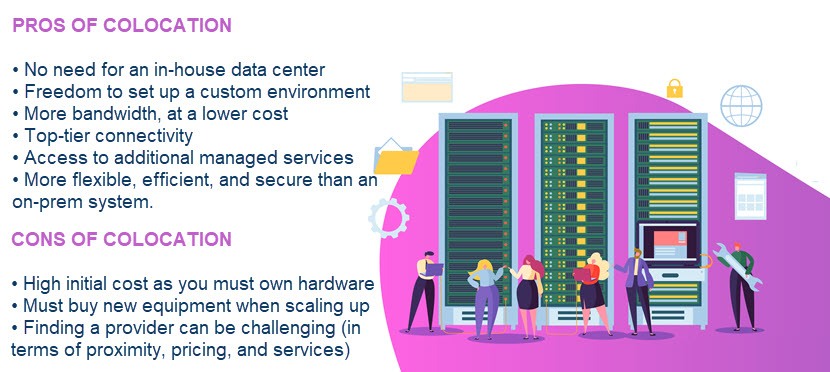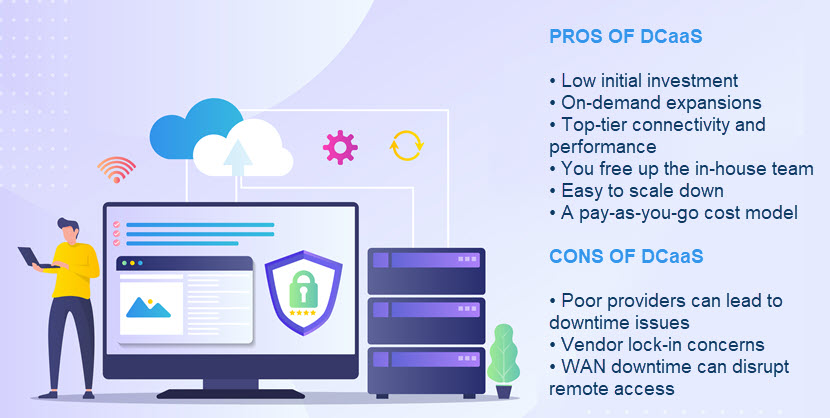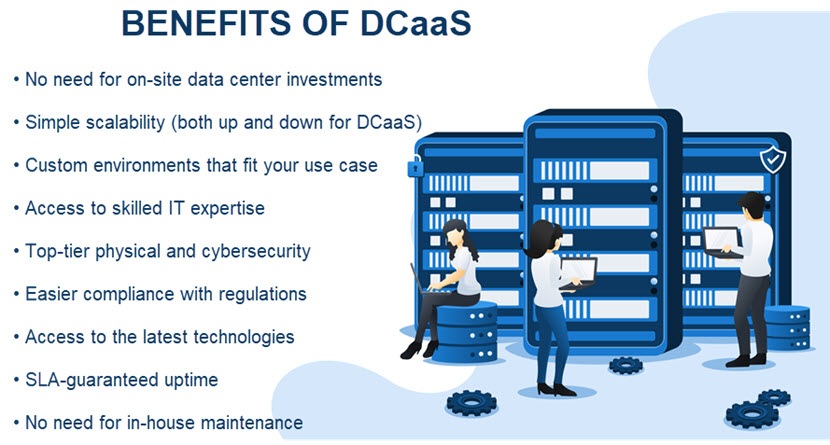Creating and maintaining a hosting infrastructure in-house is time-consuming, expensive and complex. Data center outsourcing may be the best option for you if your company is on a tight budget or has an inexperienced team of IT professionals. Outsourcing enables you to set up a reliable hosting environment without steep equipment or staff investments.
This article is an intro to data center outsourcing (DCO), a cost-effective alternative to running an in-house hosting facility. We provide all the info you need to evaluate whether to go for an external data center or keep servers on-site, so read on to learn how your business can benefit from a third-party data center.
What is Data Center Outsourcing?
Data center outsourcing (DCO) is the practice of partially or fully outsourcing IT infrastructure and hosting management from a third-party data center. The main goal of DCO is to provide top-tier hosting equipment and staff members that clients do not have on an in-house level due to financial constraints or strategic budgeting.
DCO is a broad term and can include various services, such as:
Most providers will allow you to pick and choose between these services to create a tailored hosting arrangement ideal for your use case. DCO contracts are typically annual or multi-year, although some vendors offer monthly payment models.
High availability, system resilience, and uptime.
However, data center outsourcing can also have certain drawbacks compared to in-house hosting. Some significant risks are:
- Lack of direct control over hardware.
- Customization limitations (especially in terms of security procedures and disaster recovery).
- Vendor lock-in concerns.
- Luckily, siding with a reputable partner and defining a strict Service Level Agreement (SLA) is typically enough to counter these risks.
- The data center tiering system helps identify the best hosting facilities in the industry. Our article on data center tiers teaches all you need to know about the tiering system and explains what you can expect from each facility type.
Reasons Why Companies Choose DCO Over On-Site Hosting
- Typical clients of data center outsourcing are companies that:
- Have rapidly evolving data center and hosting needs.
- Do not have the in-house expertise or the equipment needed to host apps and data on-premises.
Have data center operations that are not cost-competitive.
However, SMBs and growing businesses are not the only candidates for data center outsourcing. Large enterprises often rely on DCO to partially outsource their data center needs, either to:

Host CPU-hungry processes at a third-party facility while keeping mission-critical apps in-house.
Host a set of apps and databases at a geographic location close to a customer group.
- Here are the
- top five reasons
- businesses decide to use DCO over an on-prem hosting environment:
Cost:
- A new data center takes years to build and costs millions to maintain (building construction, gear purchasing, fiber installation, taxes, staff expenses, electricity costs, maintenance, etc.). Outsourcing resolves most budgetary problems of an on-site data center.
- High performance:
DCO enables access to all the resources you need to create a high-performing system that does not suffer from network latency, congestion, or connectivity issues.Compliance: A high-tier data center and experienced staff help satisfy regulatory requirements (typically obligations related to data privacy laws (such as GDPR and CCPA) or strict industry-specific regulations like PCI and HIPAA).
- Improved security: Not only do data center vendors offer high-level cybersecurity, but these facilities also rely on top-tier physical security measures (biometric scanning, video surveillance, alarms, mantraps, 24/7 guards, etc. ).
- Expertise shortage: Running a well-oiled, profitable on-prem data center requires seasoned operators that are expensive to hire, hard to find, and even harder to keep.
- Our article on data center migration explains everything you need to cover to relocate your hosting equipment quickly and effectively. Data Center Outsourcing Models
- There are two main data center outsourcing models: Colocation
- (setting up privately owned IT equipment at a third-party data center).Data Center as a Service
(renting the physical infrastructure from a provider).
Some DCO providers are also willing to manage customer-owned or leased hosting equipment on the client’s premises. This is not a DCO model but you should know about this on-site support, especially if you are looking to modernize an old infrastructure through virtualization.
Let us take an in-depth look at what colocation and Data Center as a Service can offer to your business.
- ColocationColocation enables a client to rent or lease space in a third-party facility and move in privately owned computing, storage, and networking gear. Choosing colocation eliminates the expense of building and operating a hosting facility, but you need to own storage and server units.
- A colocation provider offers clients access to:Physical space within a data center (a room, cabinet, rack, or cage).
Supporting equipment (power, cooling, ventilation, etc. ).
Connectivity and bandwidth.

Telco access for WAN support.
Dedicated meet-me rooms.
Physical security.
- High levels of equipment redundancy.
- Depending on your needs, you can colocate an entire facility (
- wholesale colocation
- ) or reserve a room, a rack, or space within a rack (
- retail colocation
- ). The more space you take up, the higher the colocation price, which is why retail colocation is the choice for most clients.
- While some companies that use colocation rely on their in-house team for management, most data centers offer managed colocation. The provider’s staff can handle basic to advanced maintenance at the clients’ request, such as:
Moving cables. Changing gear configurations .Cycling power and rebooting. Removing or installing gear. Monitoring the environment.
Updating software.
- This data center outsourcing model is ideal for companies that:
- Have their own IT equipment.
- Operate in an office that is close to the data center.
- Have the in-house expertise to fine-tune and manage the setup.
- Already have an established data center but do not wish to invest in additional space.
- Want to get specific workloads and data geographically closer to users (either to ensure high performance or regulative demands).
Our colocation services enable you to set up equipment at an enterprise-grade facility in Arizona and rely on various managed services to streamline day-to-day operations.
- Data Center as a Service (DCaaS)
- Data Center as a Service (DCaaS) is a hosting offering in which a client rents or leases the provider’s physical data center infrastructure (servers, networking, storage, etc.). Besides the hosting essentials, a DCaaS vendor can offer custom plans that also include:
- Depending on your needs, a provider can offer physical rack servers, blade servers, or virtual servers. Some vendors also offer a hybrid configuration that relies on a physical unit and provides access to public cloud resources.
- Like with colocation, a DCaaS client can either outsource the entire or a part of the data center. Either way, the client’s team can access the computing resources remotely across a wide-area network (WAN).
- CaaS offerings tend to have a pay-as-you-go model, so clients only pay for what they actively use. This cloud-like flexibility enables clients to scale the setup up or down to adjust current usage and eliminate overhead.

This data center outsourcing model is ideal for companies that:
Do not own any hosting equipment.
Wish to run mission-critical apps in-house and outsource the rest to a third-party provider.
Want to boost operational efficiency and improve cost-effectiveness during scaling. Can no longer expand its private data center (due to a lack of power, rack space, capital, bandwidth, experienced staff, etc. A virtual data center is similar to a DCaaS, but it relies on cloud resources rather than hardware. PhoenixNAP’s virtual private data center offering enables you to create a software-defined hosting environment that is highly scalable, agile, and custom-tailored to your use case. Benefits of DCO (Data Center Outsourcing)
Data center outsourcing offers a range of benefits that can improve the way a company operates, scales, and meets user demands. The following are some of the key benefits:
- Lack upfront investments:
- DCO eliminates large-scale investments in hardware and personnel. DCaaS ensures that you will never spend more than you need to on resources, as you are able to expand and shrink your data center footprint as needed. The bandwidth costs are also significantly lower than what you would have to pay for an on-site setup.
- Access to otherwise unavailable resources:
- Data center outsourcing enables a business to leverage the people, processes, and equipment usually unavailable on an in-house level.
Cutting-edge tech:

A leading data center provider is typically an early tech adopter ahead of the curve in deploying new IT technologies. DCO can help you get access to the latest technology and the staff who know how to use it. In addition, most reputable data centers have carrier neutrality that offers even more flexibility.
Better all-around security:
- Data centers offer top-tier physical safety and protection from cyber-attacks. The majority of businesses can’t afford to provide the same level protection themselves. Additionally, high levels of redundancy (with uninterrupted power supplies (UPS) and backup generators) help keep you online in most scenarios.Easier compliance:
- Data center providers are responsible for meeting legal and regulatory compliances, relieving some of the pressure from your company. Free up the in-house team:
- Managed IT services reduce the day-to-day maintenance chores and allow your team to concentrate on core apps and revenue-driving deliverables. Puyka’s managed services enable you to free up your IT staff from time-consuming infrastructure management and focus the team on driving business success.
- A Cost-Effective Way to a Reliable Data Center For organizations without the budget or in-house expertise to run an on-prem data center, DCO is a no-brainer. DCO is a cost-effective way to get a reliable data center.
